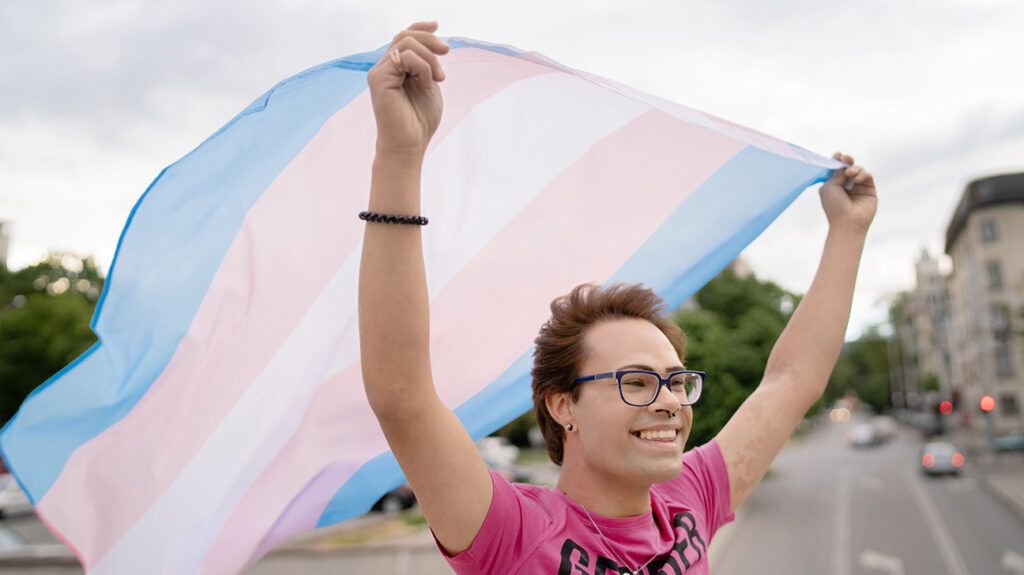Autistic people report higher rates of noncisgender identities, and gender diverse folks self-report higher rates of autistic traits.

A note on gender identity
Because the term “trans” means “change,” anyone who isn’t cisgender could identify as transgender, including folks who fall under the umbrella of nonbinary or gender nonconforming.
Still, gender is an aspect of a person’s identity and can be defined only by said individual.
For this piece, Psych Central uses the language within the research on the connection between autism spectrum disorder (ASD) and “gender diversity.” Researchers use this term to denote people who aren’t cisgender — those whose gender identities divert from their sex assigned at birth.
Autistic people are more likely to have gender diversity than neurotypical people, and folks who are gender diverse are more likely to have autism than cisgender folks, according to recent studies,
This study suggests that people who don’t identify with their assigned sex at birth are 3 to 6 times more likely to report autism-related behaviors and be diagnosed with ASD than their cisgender counterparts.
The short answer: There’s no definitive answer.
It’s important to note that these studies have researched data connected to correlation rather than causation. There’s nothing implying that autism leads to a trans or nonbinary identity, or vice versa.
But there are a few hypotheses researchers have made for the connection between the two.
Autistic folks are familiar with operating outside of societal norms and expectations and may be more comfortable openly identifying with something outside of cisgender.
The converse could also be true,
Feeling a sense of affiliation with a particular social group is thought to have a positive effect on mental well-being, according to research from 2010. This is true for folks of varied gender identities and autistic folks independently.
Navigating gender dysphoria or being in an environment without inclusive support can affect how a person meshes with a particular group, and autism is known to affect how individuals interact in social settings.
Holistic practices
Because autistic folks have
The implications of studies like these show the necessity of well-rounded practitioners. Clinicians within behavioral health or ASD-specific fields being privy to the potential of this connection can aid in a more inclusive approach to their work with clients.
Similarly, for folks doing intentional work with gender-diverse clients, being more mindful of the potential for neurodiversities can make for a more comfortable and inclusive environment.
The correlation also highlights the necessity to address gaps in autism diagnoses. Because many conditions and neurodivergences have been researched and tested with white, cismale subjects, ASD within ciswomen and girls has often been overlooked due to the variances in presentation and traits.
Researchers believe there’s potential for this to be the case for gender-diverse individuals as well.
Space needs to be made equally for both of these identities, rather than one being ignored or put on the back burner.
People are full of complexities
According to a 2018 study, 32% of autistic folks who have sought gender-affirming care have had their identities questioned due to their ASD diagnosis.
This perspective not only bars a person from receiving the medical support they need but also has treated one of these pieces as something to be “solved.”
This isn’t an excuse to pathologize gender identity
Also, language surrounding varied mental health disorders or neurodivergences and their connection to gender diversity should be handled with sensitivity due to the historical discrimination against the LGBTQIA+ community and the negative effects it has on a person’s mental health.
It wasn’t until 1973 that “homosexuality” was removed from the Diagnostic and Statistical Manual of Mental Disorders (DSM), no longer making being gay a mental health disorder.
Within the newest update of the DSM-5, a more intentional approach was taken regarding gender identities and sexuality. But there are still inclusions within the manual that LGBTQIA+ advocates question, including transvestic disorder, which could enable a clinician to frame someone being trans as a condition rather than an aspect of their identity.
Several studies within the past 12 years have suggested a correlation between ASD diagnoses, self-reported autism symptoms, and what researchers call “gender diversity.”
For folks who are both gender diverse and autistic, this data serves as support for the presence of a wide community that exists.
In addition to better understanding the overall clinical needs of autistic and gender-diverse folks, additional studies are needed to uncover the root of the correlation between the two identity groups.
It’s important to ensure that the connection between ASD and gender diversity doesn’t lead to pathologizing or suppressing an identity.
Instead, clinicians can use the available data to widen their holistic practices and potentially better understand their diverse clientele.
